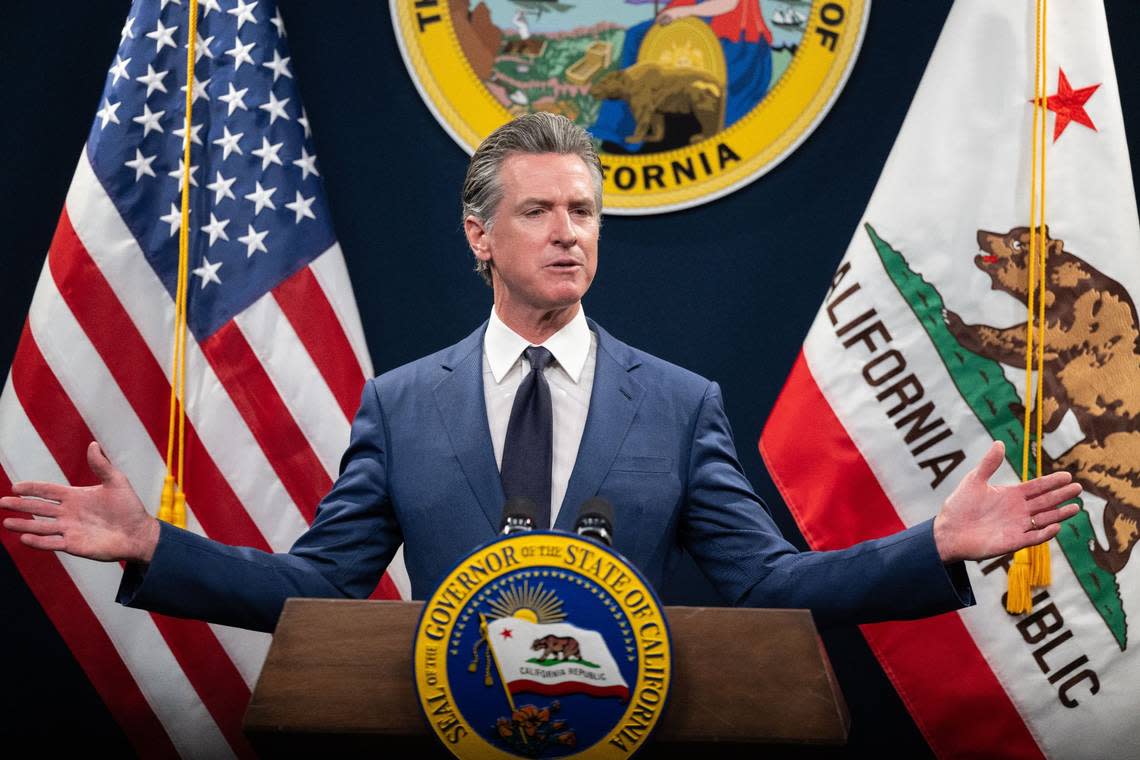Gov. Gavin Newsom labels California a ‘beacon of hope’ in State of the State speech

- Oops!Something went wrong.Please try again later.
In a sweeping State of the State address Tuesday, California Gov. Gavin Newsom characterized 2024 as a year that’s “another extraordinary moment in history” as he lifted California as a beacon to the world that has proven an “antidote to the poisonous populism of the right.”
The pre-recorded speech, released simultaneously across the governor’s social media channels and website with a copy delivered to the Legislature in advance, appeared aimed at a national audience as much Californians.
It comes two days before the first presidential debate in Atlanta between President Joe Biden and former President Donald Trump. Newsom has said he is not running for president this year but has taken the sort of steps candidates take to prepare for a possible run in the future.
His Tuesday speech comes as Newsom and the Legislature closed a nearly $300 billion budget deal announced over the weekend, closing a $47 billion shortfall.
Newsom touched on his priorities and highlighted successes of his administration on reproductive rights, climate action, gun safety, immigration and combating homelessness.
He spoke about California approving a two-year balanced budget and touched on efforts to curb retail theft, which is expected to be a bruising fight at the ballot box in November.
Highlighted issues
Newsom has repeatedly taken on red states and assailed abortion restrictions and limitations in advertisements and alternatively via California legislation.
The governor and state lawmakers unveiled an emergency bill in April – which was swiftly approved – that gave abortion providers temporary protection if they care for Arizona patients in California. The legislation made the Golden State the first in the nation to allow doctors from out of state to perform abortion services outside their home state.
“As extreme politicians in other states take away women’s rights, California stands as a beacon of self-determination,” Newsom said in his speech. “Together with this Legislature, we have passed some of the strongest laws in the nation protecting women’s health … We will never turn our backs on women or threaten their freedom to determine what’s best for their bodies.”
On climate and innovation, the governor asserted, California has no peer.
“We know that protecting the environment improves our economy,” Newsom said. “Look no further for proof of California’s economic dominance than the revolution happening right now with clean cars. We are home to 60 zero-emission vehicle companies. The global EV market would not exist without California’s leadership.”
And, the governor touched on artificial intelligence saying “It’s no mistake that California is the birthplace of what’s called the Fourth Industrial Revolution.”
He mentioned Nvidia, the California chipmaker that creates AI systems and which has catapulted to the top as the world’s most valuable public company.
“As they grow, they’re nurturing a startup ecosystem that may prove to be the most fertile in economic history. It’s no mistake that California is the birthplace of what’s called the Fourth Industrial Revolution — artificial intelligence,” Newsom said.
Among other issues, the governor also highlighted his approach to solving homelessness.
“When it comes to America’s homelessness problem, California’s detractors have similarly offered nothing but rhetoric, moaning and casting blame. No state has done as much as California in addressing the pernicious problem of homelessness that too many politicians have ignored for too long.” Newsom asserted.
The governor said since he came into office in 2019 he has focused on homelessness and mental health.
“While the causes of homelessness are indeed complex, the solution is rather simple: housing and supportive services. That’s why we focused on reforms specifically to address housing needs,” the governor said, adding he has signed into law 32 housing-related to the California Environmental Quality Act reforms “to build more housing faster. And we created the Housing Accountability Unit to make sure cities and counties are doing their part to help build their fair share of housing.”
Return to broader themes
Newsom returned to broader national themes time and time again in his nearly 30-minute talk.
“We are presented with a choice between a society that embraces our values and a world darkened by division and discrimination,” the governor said, foreshadowing what he views as the bigger battle shaping up between the right and the left.
“The economic prosperity, health, safety and freedom that we enjoy are under assault. Forces are threatening the very foundation of California’s success — our pluralism, our innovative spirit, and our diversity.,” he said.
The governor concluded on an optimistic note, saying California is “where the most creative people in the world want to be … A place where a world-class education leads to a world-class job, where that world-class job leads to a brighter future, where standing out makes you outstanding.”
“This is the future California is creating now. We are solving our most pressing problems with enthusiasm, resolve, and a California spirit that allows us to accomplish anything,” Newsom said. “Anyone who really knows California knows that the state of our state is strong and resilient — a beacon to the world.”
Originally scheduled for March, the speech was delayed as the administration awaited the results of a ballot measure, Proposition 1, that the governor had championed.
The initiative, which taps nearly $6.4 billion to target those who are in crisis, experiencing chronic homelessness or have mental health or substance abuse problems, as well as helping provide veteran housing, was approved by voters in March by a razor-thin margin.
The annual State of the State speech generally highlights accomplishments and lays out an administration’s goals and policies. Newsom’s past addresses have focused on the state’s most pressing issues, including homelessness, climate change, housing and wildfires.


